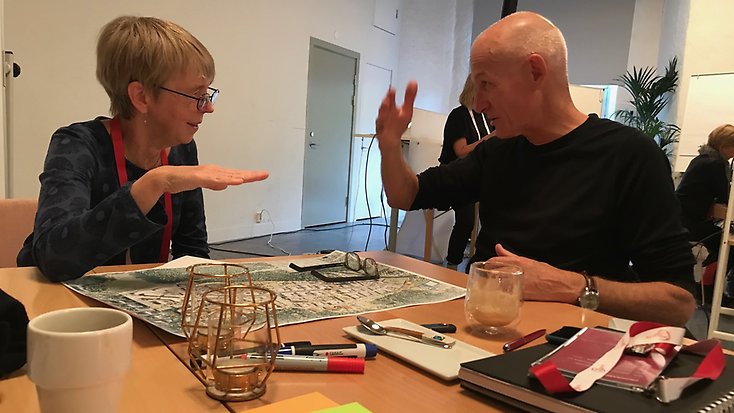"Make kids happy: make more money" - interview with London based urban developer Roger Madelin

Roger Madelin and urban planner Karin Åkerblom from Uppsala municipality meet and discuss during the summit.
Roger Madelin has a long career in urban development. In 2016 he was appointed to lead the development of British Land’s 46-acre Canada Water site in London, which will feature two million sq ft of workspace, 3,500 homes and one million sq ft of retail and leisure. Before joining British Land Madelin was at the firm Argent, where he was instrumental in the redevelopment of King’s Cross in London – a redevelopment project widely recognised as a success in terms of good place-making. We spoke with Mr. Madelin about the need for designing urban spaces for children and how to involve children in the design process.
In a previous interview you had given you mentioned that you had probably met 7,500 people in the consultative process for the Kings Cross development. Were children and young people a part of that, and were the consultations with them a separate process? Can you tell me a little bit more about the process you followed with regards to children participating?
It was a separate process. So, for the children, we worked very closely with a company that is now called Soundings, they used to be called Fluid. They did all the groundwork to make sure the schools were interested in their kids participating in thinking about what this part of London around them might become. Some of the work they put into their school curriculum involved what their journeys were to school, what they thought of the areas around them, as well as some of the more aspirational things as to how they would imagine a new city or a new environment happening.
As you can imagine, we had some extraordinary ideas, very modern looking cities. But also some interesting little sketches of quiet areas for them, and play areas. Ideas for adventure play very much was a thing. And we asked them all where their favourite places were, and we gave some of them cameras as well, and so they took pictures of their friends and places where they liked to be. The children came up with 20 ideas, some of which have now happened at Kings Cross.
I think Canada water is a better opportunity than Kings Cross. I believe today there is a lot more understanding and support for the need for outdoor space for recreation and rest and recuperation. Particularly in London, the idea of families with kids has become generally accepted as a very good thing, even for business. And that was why we were very different at Kings Cross, we said we're going to make Kings Cross a place where families with young kids want to come. And they want to spend time, and they want to come back, and they want to tell their friends. Cities are about discovery in different spaces, different activities, different times of the day and different ages and parents", says Mr. Roger Mandelin.
Did you learn any lessons from involving children and young people in the Kings Cross project that you are now applying to the Canada Water project?
We are very lucky at Canada Water. Immediately on the edge of our land we have 120 acres of parks and woodland. That is an extraordinary opportunity. We've got a big dock there; we're going to do a new park. We are going to do walkways up all the buildings. We've got vast amounts of nature here already. Something that if you're a young kid, you can climb on it, or run around it or hide behind it.
Teenagers are a challenge for all of us. They like privacy, and they like sulking off with their friends, and they don't want others to watch. And some of them like climbing and kicking a football around. If we can incorporate stuff for the younger ones but also the teens, I think we've cracked it.
I am very lucky with Canada Water because we own 53 acres. We've got the money and we've got the time. I think looking at most cities where they practice ownership, you are dealing with a lot of existing constraints, and if it's new building, there are lots of different agendas going on. How you can work with what you've got and what you're not entirely in control with, to make it better for everyone, and more exciting, and how you can communicate that to people who you aren't necessarily in control of is key", says Mr. Mandelin.
